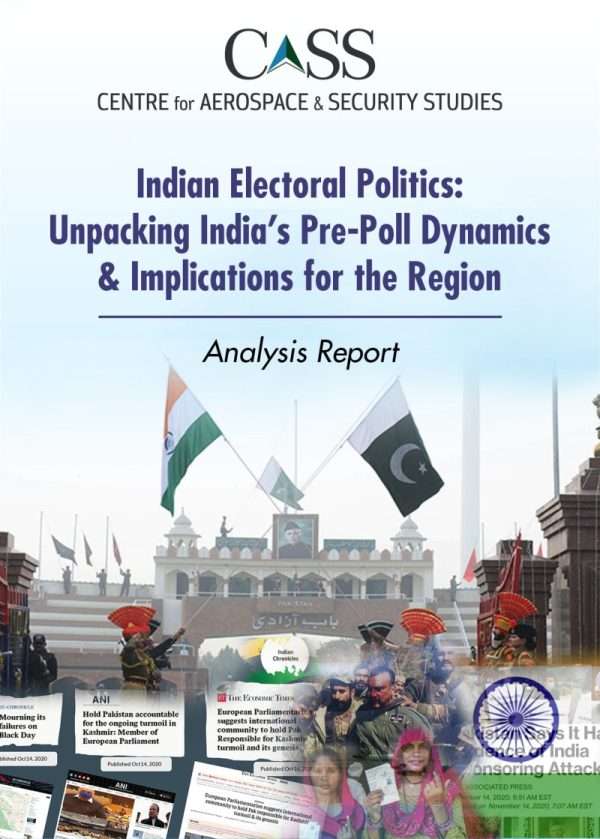The next General Elections in India are planned in April-May 2024. Going by the past practices, the BJP government is expected to draw domestic political mileage by playing the security card. Pakistan is likely to be the target of Indian diplomatic and media onslaught. India is also expected to venture into a limited military operation to up the ante and incite anti-Pakistan sentiments which can be effectively translated into the BJP’s electoral gains. Recent provocative statements by Indian leaders, notably by the Defence Minister are prelude to such actions. This seminar aimed to discuss the challenges to regional security in the wake of Indian actions in the diplomatic, media and military domains during the run-up to the elections.
The moderator Air Marshal Farooq Habib (Retd), Senior Director at CASS, in his opening address set the stage for the proceedings and highlighted the challenges Pakistan historically faced due to its proximity to India, accentuated by her hegemonic aspirations. He argued that the BJP’s unbridled ambition to win elections has emerged as the most significant factor in India’s relationship with Pakistan as it invariably counts on invoking anti-Pakistan sentiments domestically to gain electoral victory. He cited past incidents, including the Mumbai attack and the Pulwama, as examples where such strategies provoked anti-Pakistan feelings benefitting incumbent Indian governments. He also commented on recent belligerent remarks from Indian leaders and warned of potential escalatory measures in diplomatic, media and military spheres. While stressing the need for timely response he argued that Pakistan’s response must be reflective of the past experiences, current realities and future contingencies.
Speaking on ‘Indian Electoral Politics: Implications for Diplomacy and Options for Pakistan’, Ambassador Ashraf Jehangir Qazi discussed Prime Minister Modi’s anticipated approach towards the 2024 Lok Sabha elections, while agreeing that he would certainly leverage the security narrative against Pakistan. Ambassador Qazi noted past instances where Pakistan was blamed for attacks in Indian Illegally Occupied Jammu & Kashmir (IIOJ&K) region, predicting that such tactics were likely to be amplified in the run-up to the elections. He further predicted attempts by India to exploit internal issues in regions like Gilgit-Baltistan. Reflecting on global reactions, he highlighted the lack of support from the Western political and security community for Pakistan, particularly post-Pulwama, Balakot, and the annexation of IIOJ&K, attributing it to India’s burgeoning reputation as an ascending global power. Delineating Pakistan’s strategic options, Ambassador Qazi argued that proactive diplomacy alone would not be sufficient to counter Indian escalations. He contended that international apathy to India’s alleged exploitation of the security narrative for electoral mileage would persist unless Pakistan focused on internal governance reforms.

Beyond Autopilot: Unmanned Systems and their Dual Use Potential
Unmanned systems, driven by rapid technological advancements, have become pivotal not only in the military domain but in civilian arenas also because of their dual nature. So far, most of the available literature looks at the military utility of unmanned systems only. However, this article sheds light on the usefulness of
12 views

How Vulnerable is the Aviation Industry to Cybersecurity Risks?
The aviation industry has embraced widespread digitalisation over the past decade to improve passenger experience and operational efficiency. However, according to the UN’s International Civil Aviation Organisation (ICAO), this advancement has exposed the industry to increasing cyber-attacks. Notably, a major cyber-attack against a global IT supplier in February 2021 underscored
33 views

Daniel McDowell, Bucking the Buck
Daniel McDowell’s book Bucking the Buck: US Financial Sanctions and the International Backlash against the Dollar is a notable addition to the literature on the de-dollarisation trend and its underlying motives. In it, McDowell critically analyses the influence of the overuse of economic sanctions by the United States (US)
44 views

© 2022 CASSTT ALL RIGHTS RESERVED
Developed By Team CASSTT
Contact CASS
CASS (Centre for Aerospace & Security Studies), Old Airport Road, Islamabad
+92 51 5405011
cass.thinkers@casstt.com
career@casstt.com
All views and opinions expressed or implied are those of the authors/speakers/internal and external scholars and should not be construed as carrying the official sanction of CASS.
